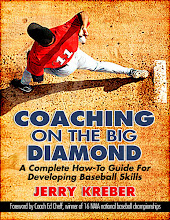Wednesday, March 15, 2006
The Next Stage

Stage Five:
Front-Side Tilt
Front-Side Tilt
Almost in unison with the Stage Four, effective pitchers will have front side shoulder tilt. The tilt, in the front side, is a direct result of a full upper arm circle by the pitcher. As the pitcher extends their arm out of the glove, their glove side will naturally rise. Their glove side will provide leverage toward the plate. Increased leverage will not only provide directional support, but higher pitch velocities
As the pitcher circles their upper pitching arm, the pitchers glove side elevates higher than the pitching arm. The pitcher’s glove arm should be extended, pointing directly at the target. The pitcher’s glove arm should stay in a straight line with the target. Keeping the line straight, allows the pitcher to apply all available force forward. Furthermore, keeping in a straight line with the target, forces the pitcher not to bring the ball behind their body. Once the ball is behind the pitcher’s body, they must pull their glove side to side to release the pitch for a strike. Using lateral directional force puts a tremendous amount of strain on the elbow.
Higher velocity is another benefit of the front side shoulder tilt. First, pitchers get to couple the force to the plate by using the glove arm. If the glove arm is extended and raised, pitchers are allowed to pull them forcefully toward second base. This action should increase the momentum and speed of the throwing arm. Secondly, when a pitcher’s forearm is not turned over, force is not being applied to the back of the ball. The humerus bone, when external rotated, turns the forearm over. The earlier the humerus bone is externally rotated the more time the pitcher can apply force to the ball.

As you can see, in each picture posted, every athlete is demonstrating a front side shoulder tilt. Not only is the tilt practiced in baseball, but football as well. Look at Tommy Maddox, he is showing how the tilt is used to create force while throwing a football. The tilt is created by flexion in the rear leg which happens during Stage III.
